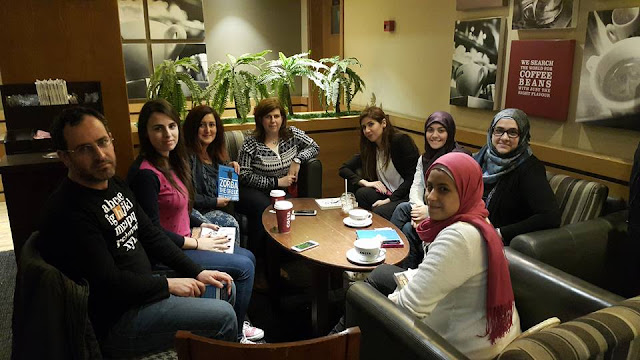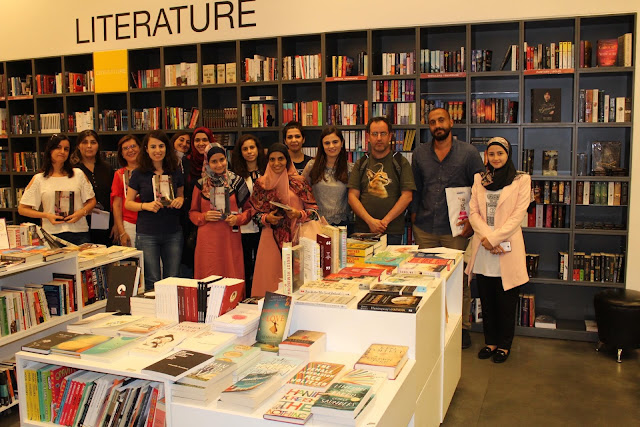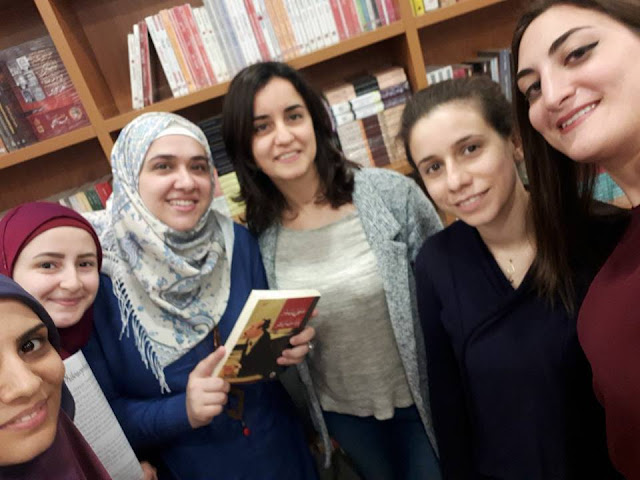Discussion of Zorba The Greek by Nikos Kazantzakis
On February 23rd 2016, we had our meeting at Costa Café in Hamra Street at 5:30 to discuss Zorba The Greek by Nikos Kazantzakis. This book was picked as the first book of our books around the world theme for all of year 2016. Zorba is our voted book from Greece!
The discussion of Zorba was led by our member Rihab who also prepared some Zorba bookmarks.
Download the Zorba Bookmarks Here
I will share my Goodreads review of the book:
Women, the sea, alcohol, food, and hard work are the priorities of Alexis Zorba's life. He embraces the divine and the demonic in him; he laughs at customs, books, dogmas, patriotism, and the supernatural. Dancing is the way he handles extreme emotions. He needs his drink at night so that his soul can feel free. He is thirsty for love; and the more physical love he attains, the more emotional warmth he looks for.
Zorba is painted as an extraordinary madman or wise man by many. To me, he is a very simple man with lots of simple needs and some sass. He looks for instantaneous rewards and satisfaction. He wants things now, right now. These needs are primitive needs: food, alcohol, sex, and money. He disregards everything that gets in the way of him getting these needs.
Now, the narrator is far more interesting. He is really struggling. He reflects a lot before deciding on what to do in order to minimize future regrets. He is torn between becoming a Buddha, and satisfying his primitive bodily needs. So, he is quite the opposite of Alexis. He is complex! And, God I love complex characters! He goes to books, writes all night, relies on intuition, daydreams, and floats around. Alexis' 'erratic' lifestyle and beliefs draw him in like a moth is drawn to the brightness. But is a fire burning so bright, or is it a transcendent light? I think it is both. I think that the narrator wasn't right, and Zorba wasn't right. They're both at extremes. I guess that humans would be happiest if they can satisfy both their primitive and their higher intellectual needs. (Think Maslow's pyramid of needs)
The novel was quite enjoyable, especially in the first and last quarters. The middle was a bit redundant. The writing style was good. I especially loved the narrator's reflections and inner reasoning. The author was able to transport me to the shores of Crete in Greece. For that, I am highly grateful. This is an unforgettable duo of characters. I quite enjoyed the movie starring Anthony Quinn.
“Every man has his folly, but the greatest folly of all … is not to have one.”
Let us enjoy our follies while they last!
The discussion of Zorba was led by our member Rihab who also prepared some Zorba bookmarks.
Download the Zorba Bookmarks Here
I will share my Goodreads review of the book:
Women, the sea, alcohol, food, and hard work are the priorities of Alexis Zorba's life. He embraces the divine and the demonic in him; he laughs at customs, books, dogmas, patriotism, and the supernatural. Dancing is the way he handles extreme emotions. He needs his drink at night so that his soul can feel free. He is thirsty for love; and the more physical love he attains, the more emotional warmth he looks for.
Zorba is painted as an extraordinary madman or wise man by many. To me, he is a very simple man with lots of simple needs and some sass. He looks for instantaneous rewards and satisfaction. He wants things now, right now. These needs are primitive needs: food, alcohol, sex, and money. He disregards everything that gets in the way of him getting these needs.
Now, the narrator is far more interesting. He is really struggling. He reflects a lot before deciding on what to do in order to minimize future regrets. He is torn between becoming a Buddha, and satisfying his primitive bodily needs. So, he is quite the opposite of Alexis. He is complex! And, God I love complex characters! He goes to books, writes all night, relies on intuition, daydreams, and floats around. Alexis' 'erratic' lifestyle and beliefs draw him in like a moth is drawn to the brightness. But is a fire burning so bright, or is it a transcendent light? I think it is both. I think that the narrator wasn't right, and Zorba wasn't right. They're both at extremes. I guess that humans would be happiest if they can satisfy both their primitive and their higher intellectual needs. (Think Maslow's pyramid of needs)
The novel was quite enjoyable, especially in the first and last quarters. The middle was a bit redundant. The writing style was good. I especially loved the narrator's reflections and inner reasoning. The author was able to transport me to the shores of Crete in Greece. For that, I am highly grateful. This is an unforgettable duo of characters. I quite enjoyed the movie starring Anthony Quinn.
“Every man has his folly, but the greatest folly of all … is not to have one.”
Let us enjoy our follies while they last!




The discussion was awesome :)
ReplyDelete